Are you searching for the best two-way radios to take your outdoor adventures to the next level? With countless models and technologies out there, it can be a bit overwhelming when selecting a device that works perfectly for your needs. Here we will look at what makes the best two way radios stand out from the rest – from mountain climbing and long range communications capabilities, as well as ease of use and practicality. We have rounded up our top picks based on these features so you can get ready to hit the trails with confidence!
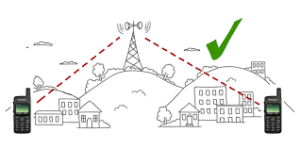
What is the best frequency for a Two Way Radio?
When selecting between VHF (136 – 174MHz) and UHF (400 – 470MHz) radios, it can be tricky to decide which is best for your needs. Generally speaking, VHF radio signals are best suited for outdoor use due to a longer range offered with the same power output as UHF devices. Unfortunately, VH frequencies may not fare well when obstruction such as buildings exist in close proximity.
UHF radios are better for indoor usage, as their signals can penetrate walls and other obstacles more easily. However, UHF radios tend to have a shorter range than VHF models when transmitting at the same power output.
For general use, it is recommended that you opt for a dual-band radio that supports both frequencies so you can switch between them depending on your needs. This will ensure maximum compatibility with varying environmental conditions and provide you with the best performance possible. It’s also important to keep in mind that marine radios must always be operated on VHF frequencies as this is the only frequency allowed by maritime regulations.
VIDEO: VHF vs UHF – What’s the difference?
What should I look for in a Two Way Radio?
Take a look at the following features of walkie talkies to help you decide which one best suits your needs.
Maximum Range
One of the most important factors to consider when deciding what 2-way radio to buy is the range you need them to cover. Different models have different ranges, so make sure you select one with the maximum range for your needs. Additionally, consider if you would like to use FRS (Family Radio Service) or GMRS (General Mobile Radio Service). FRS radios have a more limited range than GMRS radios, but may require less setup. You can read more about how the signal reception range depends on the type of radio system in our recent article Best Long Range Walkie Talkies: Top 5.
Number of Handsets
If you plan on using multiple handsets, make sure the radio you select supports the number of handsets you need. Also look for a model that allows you to expand and add additional handsets as needed.
Size and Weight
Depending on where you plan to use your 2-way radio, size and weight may be important factors to consider. If portability matters, look for smaller and lighter models. But, the size of the radio will also determine its signal range, so keep this in mind as well. Generally, larger and bulkier models may have a better signal range than more compact ones.
Bear in mind that usually, manufacturers may specify the item weight without taking into account batteries, so add this to your considerations.
Ergonomic design
If you plan to carry your walkie talkie around with you all day, go for a comfortable design with an ergonomic shape that fits comfortably in your hand or pocket. This way you’ll be able to enjoy using it without feeling any discomfort or fatigue.
Battery Life and Power Source
You’ll want to make sure the radio you select has a good battery life and that it uses rechargeable batteries. Invest in quality AA batteries from trusted brands such as Duracell for reliable performance. Or look for litium-ion battreiis, which provide a good balance between power and weight.Finally, consider the type of power source you need for your radio. Some models come with an AC adapter so they can be plugged into the wall, while others require just batteries. Decide which is right for you based on how often you’ll be using it and how portable you want it to be. Some radios even have solar-powered chargers, which can be useful if you plan on being outdoors for an extended period of time.
Rechargeable batteries and fast charger
When you’re going to use your radio frequently, look for models that come with rechargeable batteries and a fast charger. This will be more convenient than having to constantly replace regular batteries and it can also save you money in the long run.Keep in mind that some models on the market may not include a battery charger when you purchase them, so always check the product description to make sure you get the right accessories.
Durability
When deciding between different models, consider the materials used in the construction of each. Some walkie talkies are made of plastic or rubber, which may not be as durable as more rugged models made with metal or other hard-wearing components. Check the product specifications to see if it meets your needs when it comes to durability and longevity.
Water Resistance
Look for a sturdy model that is built to last and designed to withstand tough conditions if necessary—for example, if you’re looking for a model to use outdoors or in wet weather.Most walkie talkies come with an Ingress Protection (IP) rating that indicates how well the device is protected from dust and water, which will help you determine its durability. The IP rating is made up of two numbers: the first number indicates protection against solid objects like dust, while the second indicates resistance to liquid, such as rain or snow. For example, a device with an IPX3 rating is resistant to rainfall and water spraying up to 60 degrees from vertical, while an IPX7 rated model can be submerged in 1 meter of water for 30 minutes without damage. Look for a model that meets your specific needs when it comes to water and dust resistance—the higher the IP rating, the better.
Shock Resistant
If you want a walkie talkie that can withstand accidental drops, look for one with a high shock-resistant rating. This is usually measured in G forces, which indicates the amount of force it can take without breaking or malfunctioning. Models rated at 2G can generally survive a 1 meter drop onto concrete—a good minimum standard if you plan to use your radio outdoors or in other rugged conditions.
Channels & Privacy Codes
Another important factor to consider is the number of channels and privacy codes the radio offers. Most radios come with a limited number of channels, so make sure the model you choose has enough for your needs. Additionally, look for a model that offers several different privacy codes—this can be useful if you want to stay secure while communicating. With these five considerations in mind, it should be easier to find the right 2-way radio for your communication needs. Do your research and pick a model that fits all your requirements so you can get the best possible performance out of it.
VOX & Hands-Free
If you need to use your 2-way radio hands-free, look for models that come with VOX or voice activation technology. This allows you to talk without pressing any buttons and makes it easier to communicate while doing other tasks. Additionally, if you want multiple handsets so more than one person can talk at the same time, make sure the model you choose supports this feature. With these considerations in mind, finding the right 2-way radio should be an easy task. Consider all of these factors before making your purchase so you can get the best performance out of your radio and enjoy reliable communication.
NOAA Weather Alert Channels
Another feature that can be useful is NOAA weather alert channels. If you plan to use your walkie talkie outdoors, this could be a valuable addition to have as it will allow you to stay informed of any hazardous weather conditions like thunderstorms or floods. How many channels are usually available with NOAA weather alert channels? This can vary from model to model but generally, most models will provide up to seven different channels.
Flashlight and SOS Signal
You may also want to consider additional features such as a built-in flashlight or SOS signal. The flashlight can be helpful in dark environments and the SOS signal could potentially save your life during an emergency situation. If these features are important to you, make sure they are included with the model you select.
Other Additional Features
Beyond the bare essentials, there are plenty of other features that can be incredibly useful depending on your individual requirements – such as built-in GPS functions or programmed scan lists. You also may us Key Lock technology or Auto Squelch settings which shut off weak transmissions or unwanted noise due to terrain or range constraints. With the speaker and microphone, you can enjoy remarkable hands-free operation and even have the ability to listen in on other conversations.
Be sure to carefully consider which additional features might be important to have before making your purchase. With these five factors in mind, it should be easier to choose the right 2-way radio for your communication needs. Make sure you do your research and pick a model that fits all your requirements so you can get the best possible
1. The Longest Range Two Way Radios
The range depend on the following factors:
- Radio system type: RRS or GMRS. GMRS, or General Mobile Radio Service, is a type of two-way radio service that is mostly used for private communication between family and friends. It operates on the UHF (Ultra High Frequency) band and has a much longer range than FRS (Family Radio Service). The RRS Radios maximum range is up to two miles, while GMRS Radio manufactureres claim the maximum range can reach up to 38 miles on the plane sites without obstacles.
- Terrain: Flat terrain will provide better range than hilly or mountainous areas. Although UHF radio waves are weakened and can be disrupted by various objects, the most damaging obstacle to their transmission is typically a mountain. In forested areas, your signal range will shrink due to hills obstructing it rather than trees absorbing it. Conversely, in more urban environments where structures such as concrete buildings or metal reflect all radio waves, you should anticipate that with even 2 Watt power radios your range won’t exceed 1 mile!
- Wattage. Higher power output radios can generally transmit further than lower powered models. FRS that can be used by anyone with no license is limited to a power output of 0.5 watts – possibly even 1 watt; GMRS that requires licensure for transmitting is capped at 50 watts maximum. The GMRS radios typically come with higher wattage ratings and longer antennas so they can reach further distances than FRS walkie talkies.
- Antenna. An antenna with a higher gain rating will help increase the two-way radio’s coverage area. The FRS radio necessitates a non-removable antenna, meaning that it is impossible to switch out the antenna with one of a larger range. Changing this element would put its FCC certification and legality at risk as its form factor plays an integral role in efficiently emitting signals.
How far can you reach with your wireless signal, taking into consideration the topography around you?
| Terrain | Geometry | Actual Range |
| Mountains | Peak to Peak | 5 to 25 miles |
| Peak to Valley | 3 to 10 miles | |
| Front to Back | 0 miles | |
| City | Rooftop to Rooftop | 2-5 miles |
| Street to Street | < 1 mile | |
| Ocean | Boat to Boat | Distance to horizon (4 to 6 miles) |
| Forest | Flat Ground | 1-5 miles (depending on tree density) |
Midland 50 Channel Waterproof GMRS Two-Way Radio – The Longest Range

- Two-Way Communication - Stay connected to family and friends or coordinate group outings with the push of a button -...
- Features - These walkie-talkies feature 50 GMRS (General Mobile Radio Service) channels, along with a channel scan so...
- Stay In Touch - Communicate up to a 36-mile range, depending on variables, with a longer range available in open areas...
Last update on 2024-03-19 / Affiliate links
These walkie-talkies boast fifty GMRS (General Mobile Radio Service) channels, as well as a channel scan for quickly verifying activity. The JIS4 waterproof protection makes them pleasantly resistant to splashes, making these radios perfect for outdoor use. Plus, your private conversations remain confidential thanks to the 3,000 channels that can be used as privacy codes.
With a reach of up to 36 miles, varying according to several criteria, and a longer distance possible in open spaces with fewer concealed objects; EVOX technology grants you 9 levels of voice activation sensitivity for hands-free utilization while commuting. On top of that, the Mossy Oak Break-Up Country Camouflage pattern and five Animal Call Alerts (turkey, duck, crow, cougar, wolf) with an additional vibra-call feature offer even more fun for your adventures.
2. Best Two Way Radios for Mountains
For mountainous terrain, it is important to consider the range and wattage of your two-way radio.
Walkie talkies are an invaluable tool to make outdoor sports more enjoyable and secure, even when range is a limitation. For instance, activities such as rock climbing can benefit from the use of walkie talkies since partners are typically sharing a rope or paragliding where terrain should be taken into account. Thus, in these types of situations range will rarely cause any issues.
While other sports may be more limited in terms of range, skiing presents a unique case – you will usually have decent coverage while on the same side of the mountain, but can expect to lose connection entirely when there is an obstruction blocking your signal. This concept remains constant across all types of sporting activities such as biking, hiking and running trails.
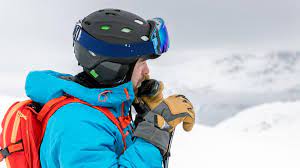
To emphasize this point further and make it easier for visual learners to comprehend; those two people located behind the mountain lack any kind radio contact whereas those with check-marks are likely able to communicate without issue!
Most of walkie talkies can work in the forest. However, it is important to take into account that radio waves are absorbed more readily by trees than they are reflected off of them. This will lead to decreased range and disruption of signals as you go deeper into a forested area. Additionally, hilly terrain can also block or disrupt your signal so certain areas may be completely unreachable with your current two-way radio setup. Furthermore, features such as GPS and Scanning functions may become limited depending on the density of tree cover. Ultimately it comes down to understanding how far your two way radio can reach while considering the type of terrain you’re in – doing this will ensure that you remain in contact with your group even if you’re in the thick of a forest!
Rocky Talkie – Best for Mountains
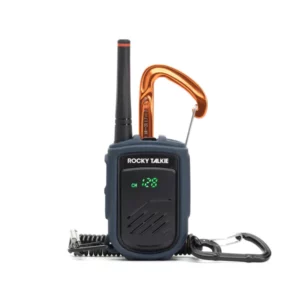
Rocky Talkies, crafted by a Colorado-based company, are the epitome of rugged backcountry radios. Their lightweight but tough build makes them an excellent choice for outdoor activities such as trekking, climbing, skiing and mountain biking. Furthermore they work excellently with other FRS & GMRS radio devices! These Rocky Talkies make your adventures that much more enjoyable – get yours today to experience the outdoors unlike ever before!
With maximum power of 2 watts and license-free, these radios provide great range and audio clarity in line-of-sight scenarios for 25+ miles, 1 to 5 miles in the mountains, 0.5 to 3 miles with hilly/forested areas and up to 1 mile for urban environments. We found their range testing video to be very informative when it comes to understanding its reach capabilities – giving us a clearer image of what we can realistically expect from this device!
Video: Introducing the Rocky Talkie by Amazon
3. Best Two Way Radios for Boating
As technology continues to advance and become more compact, handheld VHFs are now able to offer security features that were only obtainable on mounted marine radios. Frequency scanning, weather updates, GPS integration and the capability of automatically sending out distress signals are just a few examples of these convenient safety advantages!
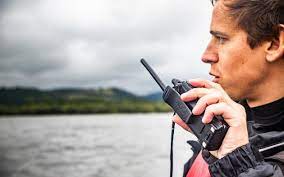
Nowadays, marine radios are built with waterproof capabilities that enable them to endure extended periods in the water without any harm to their inner mechanisms. Furthermore, they often come equipped with a strobe light that turns on automatically if dropped into dark waters which can help you locate it easily.
More feature-filled radios will be bigger and require additional screen space for options; this could lead to decreased battery life. On the other hand, smaller units may offer fewer features but can provide increased convenience or value in their compact size with more extended battery life than larger models.
Cobra HH500 handheld marine radio – Best for Boating

- Noise-Cancelling Microphone - When embarking on a marine adventure, you need a fixed-mount marine radio for...
- 6 Watt VHF – This radio provides the ability to customize your conversations when there are days you spend on the...
- Backlit plus Floats - This radio is backlit and has an easy-to-read orange display for higher visibility in all...
Last update on 2024-06-22 / Affiliate links
The Cobra HH500 is the perfect choice for any sailor who wants a dependable backup to their primary VHF set. Not only that, but it can be used in an assortment of other water-related activities as well! It charges easily with its drop-in holster/cradle system, which works off either 12v or 240v outlets so you never have to worry about running out of juice while at sea.
With its small profile and lightweight design, the Cobra HH500 is ideal for carrying on a boat, kayak or paddleboard. With its easy stowaway capabilities it also serves as an excellent emergency VHF radio that can be kept in any grab bag. Our recent group test showed this to be one of the lightest handheld VHF radios out there!
With Bluetooth connectivity, this handheld VHF enables you to make waterproof calls with your mobile phone conveniently kept in a dry bag or pocket. Furthermore, the rewind-say-again button at the top right of its keypad permits users to quickly revisit prior transmissions by recording up to 20 seconds of audio from each communication!
The Cobra HH500 handheld VHF radio is a streamlined, feature-packed device with an illuminated large screen. When sending and receiving transmissions, the display indicates signal strength on a scale for easy monitoring.
4. Best Two Way Radios for Small Bussiness
Communication is a crucial factor in the accomplishment of any project, however it can be hard to maintain contact when you work remotely. Whether you’re constructing a resort on an island with limited cell coverage or conducting an archeological excavation in the mountains, having access to reliable business two-way radios is essential. This will ensure that your team stays connected and promote both efficiency and safety at all times.
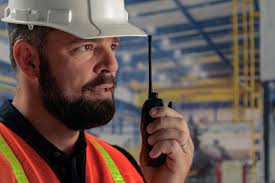
When selecting the best walkie talkies for construction, you’ll need to customize a two-way radio system that satisfies your specific needs based on the size and conditions of your site. To ensure seamless communications, select radios with crystal clear sound quality, enhanced durability against dust, water spills, bumps or drops – while utilizing UHF technology which ensures reliable long range communication in built up environments as well as from crane to ground distances. Plus multiple channels can be programmed according to requirement!
Besides, they help to give users the power to locate their exact location with GPS tracking, keep themselves safe through emergency call capabilities, enjoy an extended battery life and stay connected using simple push-to-talk (PTT) functions.
Motorola Bussiness CLS1110 5-MILE UHF Two Way Radio – Best for Small Bussiness

- Ideal for businesses that are labor-intensive or have high employee turnover
- Operates on 56 business-exclusive frequencies and features 121 codes for added security
- Rechargeable lithium ion battery provides up to 18 hours of battery life. Choice of rechargeable lithium ion or backup...
Last update on 2025-04-05 / Affiliate links
To make sure you don’t experience interference from other users, this walkie talkie operates on 56 private frequencies. Furthermore, it has up to 121 privacy codes for greater security in every call! Its rechargeable lithium ion battery provides an extended 18 hours of power; and if the battery runs out suddenly or your far away from a socket outlet, no worries – just switch to AAA batteries as backup.
This device can broadcast signals over a staggering 200,000 square feet range- that’s around 15 floors in the tallest buildings! With its keypad lock, you’ll never have to worry about making any inadvertent changes. Plus it is lightweight and compact so it won’t be too much of a burden for your journey. Stay connected with your team wherever they may roam — this device will make sure of that!
To finish off, you can select from three different call tones for incoming transmissions. From the customer reviews we read, most individuals using this device are highly satisfied – it’s reliable, lightweight and resilient!
